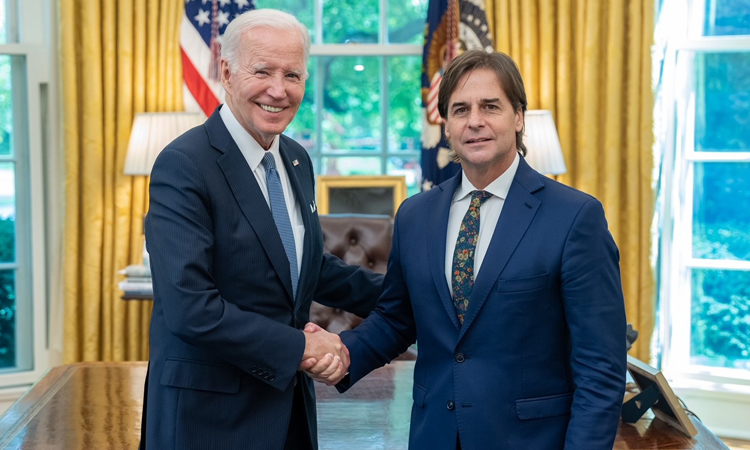Uruguayan President Luis Lacalle Pou’s surprise meeting with Joe Biden on June 13 was meant to last 15 minutes but ended up lasting an hour and a half, as the two leaders discussed boosting commercial ties between the two countries. The unexpected interest from the U.S. president came on the heels of the unveiling of a bill, the United States Uruguay Economic Partnership Act, by a bipartisan group of U.S. senators. The bill proposes to ease visa restrictions and unilaterally reduce tariffs on certain Uruguayan exports: good news for a Uruguay that strongly feels the need to open up to the world.
This could be a watershed moment for Uruguay—a sign that U.S. indifference toward the notion of new trade deals might be giving way to renewed interest, and that Lacalle Pou’s gamble on pursuing bilateral trade deals outside the Mercosur bloc might be paying off.
Although these are important steps in the right direction, the U.S. bill needs congressional approval—not guaranteed given the continued strength of the protectionist wings of both parties. Lacalle Pou cannot run for the presidency next year, meaning deepening trade ties with the U.S. and the rest of the world will depend on the next government. And in general, small, trade-dependent Uruguay, even with its strong credentials on democratic governance, ESG and overall stability, has found in recent years that opening up is a difficult task in a world ruled by realpolitik.
Enter the milonga
Uruguay’s historical foreign-policy and economic dependence on its giant neighbors Brazil and Argentina deepened in the 1990s, when it became a founding member of Mercosur. Deep regional economic integration backfired with the economic crisis of 2001-02, and Uruguay began to look outside the region. A chance for a free-trade agreement with the U.S. in 2007 was rejected by the Frente Amplio party—a mistake the party is unlikely to make again.
Uruguay’s bid for opening to the world is a gamble, since bilateral trade deals would violate Mercosur’s rules. (Uruguayan governments reject that unilateral negotiations violate the customs union’s rules.)
But despite Uruguay’s failure so far to secure free-trade agreements outside the region, exports outside of Mercosur have grown significantly, especially to China. China’s seemingly endless demand for agricultural goods meant that Uruguay saw an opportunity to secure a free trade agreement with China as early as 2016, during the second Vazquez administration. Lacalle Pou’s efforts to secure a free trade agreement with China is just a continuation of the previous government’s efforts.
But negotiations between Uruguay and China appear to have stalled after the election of Luiz Inácio Lula da Silva in Brazil. Uruguay’s foreign minister visited Beijing immediately after Lula’s visit, but he came home empty-handed. Lacalle Pou says he believes that Brazil and Argentina are lobbying China to scuttle the agreement. This underscores the difficulty that Uruguay, which is eager to open up its economy, faces in a world ruled by realpolitik.
Bringing the world home
Amid all these barriers, it will be tough for Uruguay to secure free trade agreements outside of Mercosur. Uruguay should focus instead on what it can control: education and infrastructure, both physical and digital. This can make its economy more competitive in a world that will be demanding more and better services. Uruguay is already a strong candidate for foreign investors that want to nearshore services that serve the U.S. and European markets, owing to its democratic institutions, high quality of life and favorable time zone.
Uruguay’s service sector has a strong basis for growth, with almost a quarter of Uruguay’s $22.6 billion in exports in 2022 being services. Exports of information technology surged to $960 million in 2022 from $213 million in 2016. The sector is poised for more growth as the government has introduced a “digital nomad” visa to allow for expatriates to work legally in the country for up to a year. The country also has a number of free trade zones, which exempt businesses from paying many taxes, including the construction of the World Trade Center in burgeoning Punta del Este.
Although a full-scale free-trade agreement with the U.S. remains unlikely, the U.S. is the largest market for Uruguayan service exports with an estimated 60% of all information technology exports going to the United States. Service exports could grow even more if Uruguay and the U.S. sign a double-taxation agreement, which should be the objective of the next government, especially as U.S. has an interest in deepening commercial ties.
U.S. representatives in Uruguay say that the country’s challenge to growth is the lack of qualified workers. This speaks to the biggest barrier to Uruguay’s leveling up: weak investment in human capital. To take advantage of this moment, the government should focus on boosting the competitiveness of its workforce. Uruguay’s education system is failing much of its youth: Up to 60% of young people do not finish high school. Investing heavily in education is necessary, even though the results will take many years to show. In the interim, immigration is necessary, if only to provide the workers needed to keep the dynamic service sector growing. If the world isn’t going to open up to Uruguay, Uruguay must open up to the world.
—
Saldías is a Latin America and Caribbean senior analyst at the Economist Intelligence Unit and received his PhD in political science from the University of Toronto.





